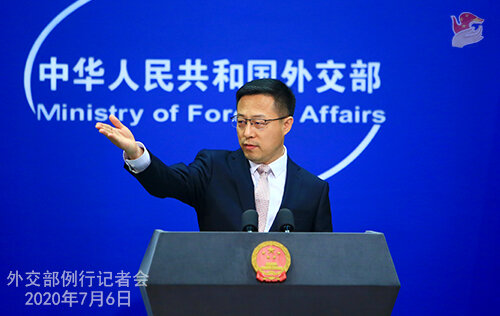China terms JCPOA as pillar of peace in West Asia

TEHRAN — Chinese Foreign Ministry spokesperson Zhao Lijian has said the Iran nuclear agreement, also known as the Joint Comprehensive Plan of Action (JCPOA), is an important pillar for the international nuclear non-proliferation regime and peace and stability in West Asia.
In a press conference on Monday, Lijian said the JCPOA is an important outcome of multilateral diplomacy endorsed by the UN Security Council resolution.
He described the U.S. withdrawal from the JCPOA and its maximum pressure on Iran as “the root cause for the tension in the current Iranian nuclear situation”, saying the accord is an important part of the international order based on international law.
He said China hopes that all parties concerned can adopt an overall and long-term perspective, make efforts to meet each other halfway, resolve differences on the implementation of the JCPOA through dialogue and consultation within the framework of the JCPOA Joint Commission, restore the balance of rights and obligations under the JCPOA, and do their best to safeguard and implement the JCPOA.
“China will maintain close communication with relevant parties, facilitate peace, promote talks, and continue working for the political and diplomatic resolution of the Iranian nuclear issue, he added.
Tensions between Iran and the U.S. have been high since U.S. President Donald Trump pulled out of the nuclear deal in May 2018 and re-imposed sanctions on all major industries in Iran, including oil and petrochemicals exports.
The Trump administration’s sanctions were imposed under the banner of a “maximum pressure” policy against Iran.
Tehran says the U.S. “maximum pressure” has produced “maximum resistance” from Iran.
The U.S. government has also made empty calls for talks, but Iran has made it clear that negotiation is always possible within existing framework of the nuclear deal and only if the U.S. returns to the deal and honors its commitments.
Asked about a 25-year accord between Iran and China, spokesman Lijian said Beijing and Tehran enjoy traditional friendship and the two sides have been in communication on the development of bilateral relations.
“We stand ready to work with Iran to steadily advance practical cooperation,” he added.
Foreign Minister Mohammad Javad Zarif said on Sunday that the 25-year partnership agreement is in line with reviving the Silk Road now called “One Belt-One Road”.
MH/PA
